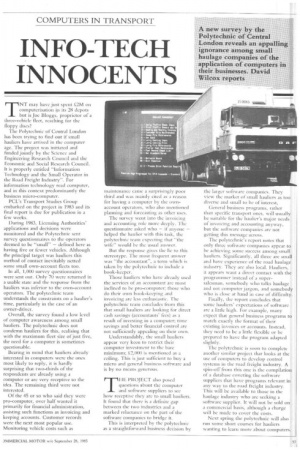INFO-TECH INNOCENTS
Page 59

If you've noticed an error in this article please click here to report it so we can fix it.
TNT may have just spent i2M on computerisation ip its 28 depots but is Joe Bloggs, proprietor of a three-vehicle fleet, reaching for the floppy discs?
The Polytechnic of Central London has been trying to find out if small hauliers have arrived in the computer age. The project was initiated and funded jointly by the Science and Engineering Research Council and the Economic and Social Research Council. It is properly entitled "Information Technology and the Small Operator in the Road Freight Industry". For information technology read computer, and in this context predominantly the business micro-computer.
PCL's Transport Studies Group embarked on the project in 1983 and its final report is due for publication in a few weeks.
During 1983, Licensing Authorities' applications and decisions were monitored and the Polytechnic sent survey questionnaires to the operators deemed to be "small" — defined here as having five or fewer vehicles. Although the principal target was hauliers this method of contact inevitably netted some small own-account fleets too.
In all, 1,000 survey questionnaires were sent out. Only 70 were returned in a usable state and the response from the hauliers was inferior to the own-account operators. The polytechnic team understands the constraints on a haulier's time, particularly in the case of an owner-driver.
Overall, the survey found a low level of computer awareness among small hauliers. The polytechnic does not condemn hauliers for this, realising that with the maximum fleet size of just five, the need for a computer is sometimes questionable.
Bearing in mind that hauliers already interested in computers were the ones most likely to reply, it is hardly surprising that two-thirds of the respondents are already using a computer or are very receptive to the idea. The remaining third were not interested.
Of the 45 or so who said they were pro-computer, over half wanted it primarily for financial administration, assisting such functions as invoicing and keeping accounts. Customer records were the next most popular use. Monitoring vehicle costs such as maintenance came a surprisingly poor third and was mainly cited as a reason for having a computer by the ownaccount operators. who also mentioned planning and forecasting as other uses.
The survey went into the invoicing and accounting role more deeply. The questionnaire asked who — if anyone — helped the haulier with this task, the polytechnic team expecting that "the wife" would be the usual answer.
But the response gives the lie to this stereotype. The most frequent answer was "the accountant'', a term which is taken by the polytechnic to include a book-keeper.
Those hauliers who have already used the services of an accountant are most inclined to he pro-computer; those who do their own book-keeping and invoicing are less enthusiastic. The polytechnic team concludes from this that small hauliers are looking for direct cash savings (accountants' fees) as a result of investing in a computer; time savings and better financial control are not sufficiently appealing on their own.
Understandably, the small hauliers appear very keen to restrict their computer investment to the hare minimum; i2,000 is mentioned as a ceiling. This is just sufficient to buy a micro and general business software and is by no means generous.
THE PROJECT also posed questions about the computer and software suppliers to see how receptive they are to small hauliers. It found that there is a definite gap between the two industries and a marked reluctance on the part of the software companies to bridge it.
This is interpreted by the polytechnic as a straightforward business decision by the larger software companies. They view the market of small hauliers as too diverse and small to be of interest, General business programs, rather than specific transport ones, will usually be suitable for the haulier's major needs of invoicing and accounting anyway, hut the software companies are not getting this message across.
The polytechnic's report notes that only three software companies appear to be achieving some success among small hauliers. Significantly, all three are small and have experience of the road haulage industry. They are also local. Hauliers, it appears want a direct contact with the programmer instead of a supersalesman, somebody who talks haulage and not computer jargon, and somebody who is close at hand in case of difficulty.
Finally, the report concludes that some hauliers' expectations of software are a little high. For example, many expect that general business programs to match exactly the format of their existing invoices Or accounts. Instead, they need to be a little flexible or be prepared to have the program adapted slightly.
The polytechnic is soon to complete another similar project that looks at the use of computers to develop control systems in the road freight industry. A spin-off from this one is the compilation of a database covering the software suppliers that have programs relevant in any way to the road freight industry. '[his will be available to those in the haulage industry who are seeking a software supplier. It will not be sold on a commercial basis, although a charge will be made to cover the costs.
Next spring the polytechnic will also run some short courses for hauliers wanting to learn more about computers.




























































































